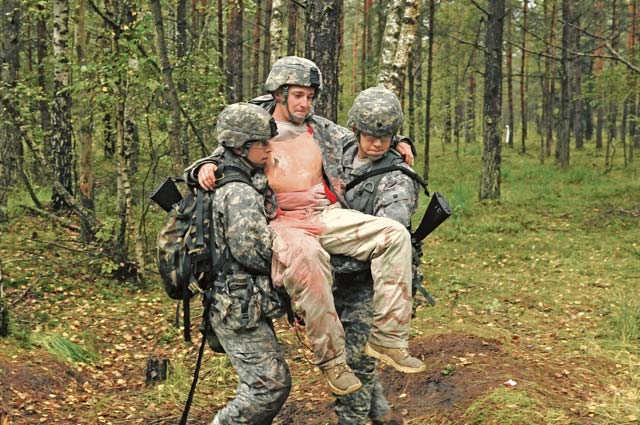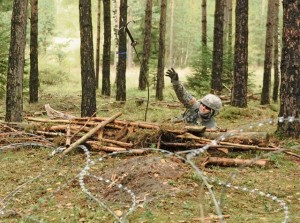
First Lt. Jorge Delgado (left), assigned to the 212th Combat Support Hospital, evacuates a casualty with the help of a support Soldier during the Expert Field Medical Badge test Sept. 13. The EFMB test is the utmost challenge to the professional competence and physical endurance of the military medical professional.
GRAFENWÖHR, Germany — Dozens of U.S. Army medical Soldiers from the KMC recently took part in U.S. Army Europe’s Expert Field Medical Badge competition, a grueling 10-day event that pushed service members to their limits to earn the coveted honor.
Soldiers who took part were from Landstuhl Regional Medical Center, the Miesau-based 212th Combat Support Hospital and the Kaiserslautern-based 21st Theater Sustainment Command. The event offered an opportunity for Soldiers to prove their medical proficiency and readiness while increasing their understanding of different nations’ medical tactics, techniques and procedures.
While the EFMB is a U.S. Army badge, USAREUR invites coalition partners and medics from the U.S. Navy, Air Force and Marine Corps to participate. Participants demonstrated proficiency in tactical combat casualty care and evacuations. They underwent a written test and field testing on common Soldier tasks, to include day and night land navigation. The final test was a 12-mile road march.
“It not only gives a service member a sense of pride that they’ve earned the prestigious, coveted badge that it is, but it also lets their peers see that they are an expert in their field,” said Sgt. 1st Class Brandon Moak, senior clinical NCO for the Department of Nursing at LRMC and EFMB Combat Testing Lane One NCO in charge.

First Lt. Michelle Bement from the 30th Medical Command at Sembach throws a grappling hook at concertina wire in order to check it for booby traps during a combat testing lane Sept. 13 at the U.S. Army Europe Expert Field Medical Badge competition in Grafenwöhr Training Area. The EFMB test consists of dozens of tasks that challenge military medical professionals throughout the U.S. Army Europe footprint.
The EFMB has a passing rate of 5 to 25 percent, making it one of the most difficult badges to earn in the U.S. Army and in the U.S. Army Medical Corps.
Hosted by the Baumholder-based 421st Multifunctional Medical Battalion, the event included more than 250 candidates, including nine participants from the U.K. and Belgium.
Joint and multinational training is key to USAREUR in maintaining enduring partnerships for regional and global security.
“I’m happy to have the opportunity to compete for the EFMB because there are only four Belgians here. There were a lot of other Belgian medics that wanted to come here, so it’s a privilege,” said Belgian army Sgt. Jeremy Vercaemer, with the 1 EMI (Unit Medical Intervention). “It’s a bit of an adaption for us because it is a different way of working. In Belgium we don’t have competitions like this.”







